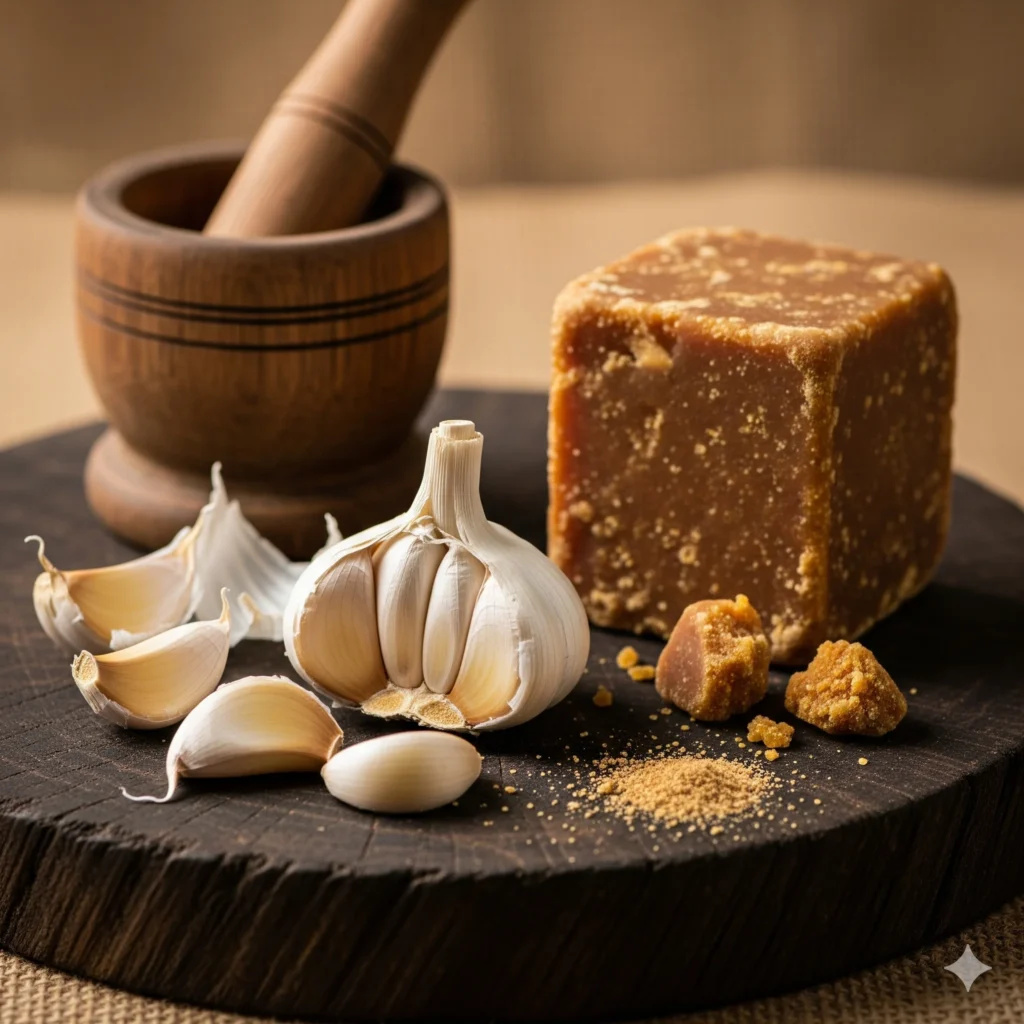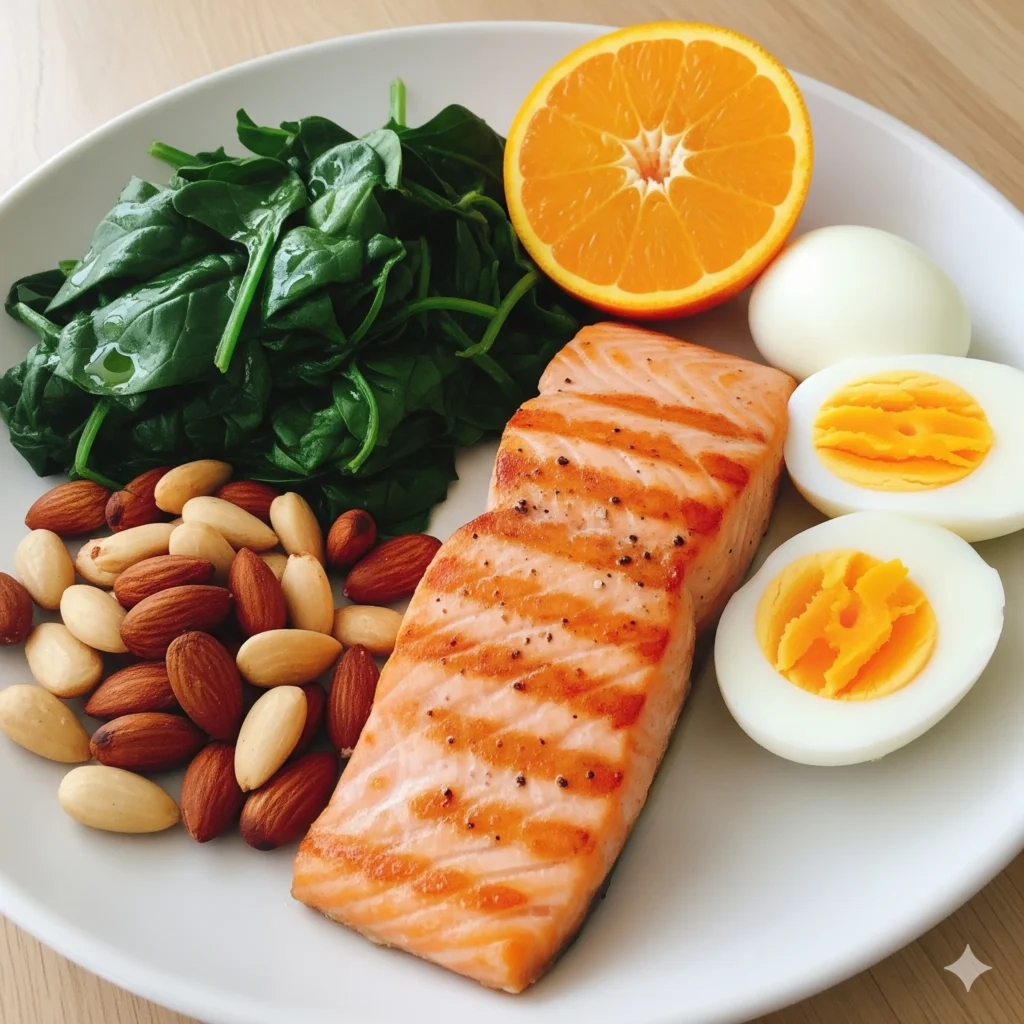🌿 Garlic and Jaggery Benefits: The #1 Ayurvedic Morning Ritual for Immunity & Digestion
Garlic and jaggery benefits aren’t just a wellness trend — they’re a powerful, science-backed health ritual used for thousands of years in Ayurveda.
This simple morning practice — eating one small garlic clove with an equal-sized piece of jaggery on an empty stomach — has been proven to:
- Boost immunity naturally
- Improve digestion and reduce bloating
- Support heart health and blood pressure
- Provide sustained energy without caffeine
- And even help you sleep better at night
And the best part? It’s not a pill, not a supplement, not an expensive detox — it’s already in your kitchen.
In this in-depth guide, we’ll reveal:
- The science behind garlic and jaggery benefits
- How to make it correctly (and when to take it)
- The #1 mistake 90% of people make
- And how it compares to the garlic and honey remedy
Let’s dive in.
🚨 Why This Ancient Ritual Works (And Why It Matters)
After 70, many seniors notice their legs feeling heavier, their balance weakening, or their ability to walk without support fading. But this decline isn’t inevitable.
With the right nutritional support, you can maintain leg strength, improve mobility, and reduce fall risk — all through science-backed vitamins and minerals.
In this comprehensive guide, we’ll reveal the 6 essential nutrients that doctors and researchers agree are crucial for essential vitamins for seniors to maintain leg strength, nerve function, and joint stability — all backed by clinical studies.
We’ll also show you:
- Which foods contain these vitamins
- How much you need daily
- When to consider supplements
- And how to use them safely
Let’s dive in.
🎯 The 6 Essential Vitamins for Essential Vitamins for Seniors to Maintain Leg Strength
After reviewing dozens of clinical studies, here are the 6 most critical nutrients for maintaining strong legs after 70:
- Vitamin D – For bones and muscles
- Vitamin B12 – For nerve and muscle function
- Vitamin C – For collagen and muscle protection
- Vitamin K2 – For bone and joint health
- Magnesium – For muscle relaxation and cramp prevention
- Vitamin E – For antioxidant protection and circulation
Let’s explore each one — what it does, how much you need, and where to get it.

✅ 1. Vitamin D: A Key Nutrient for Seniors to Maintain Leg Strength
🔬 Why It’s Essential
Vitamin D is crucial for both bone and muscle health. It helps your body absorb calcium, which keeps bones strong and prevents fractures.
But it also plays a direct role in muscle function. Low vitamin D levels are linked to:
- Muscle weakness
- Poor balance
- Increased fall risk
- Slower walking speed
A 2020 study in the Journal of the American Geriatrics Society found that seniors with low vitamin D were twice as likely to fall as those with healthy levels.
📊 How Much Do Seniors Need?
- Recommended Daily Intake (RDI): 800–1,000 IU (International Units)
- Optimal Blood Level: 30–50 ng/mL (measured via blood test)
💡 Many seniors over 70 need supplements because they don’t get enough sun or food sources.
🍽️ Best Food Sources
- Fatty fish (salmon, mackerel, sardines)
- Egg yolks
- Fortified milk and cereals
- Mushrooms (exposed to UV light)
☀️ How to Get It from Sunlight
- 15–30 minutes of midday sun (arms and legs exposed)
- 2–3 times per week
- Avoid sunscreen during this time (but don’t burn)
⚠️ Caution: Darker skin, northern climates, and indoor lifestyles reduce vitamin D synthesis.
💊 When to Consider Supplements
If your blood test shows low vitamin D, your doctor may recommend:
- Daily dose: 800–1,000 IU
- Weekly dose: 50,000 IU (prescription)
✅ Best form: Vitamin D3 (cholecalciferol) — more effective than D2.
✅ 2. Vitamin B12: The Nerve & Muscle Protector for Seniors to Maintain Leg Strength
🔬 Why It’s Essential
Vitamin B12 is critical for nerve health and muscle coordination. It helps maintain the myelin sheath — the protective coating around nerves that sends signals from your brain to your muscles.
Low B12 can cause:
- Numbness or tingling in legs
- Balance problems
- Muscle weakness
- Memory issues
A 2019 study in Nutrients found that seniors with low B12 had poorer physical performance and higher risk of disability.
📊 How Much Do Seniors Need?
- RDI: 2.4 mcg per day
- But: Seniors often need 500–1,000 mcg daily due to reduced absorption
💡 Why? Aging reduces stomach acid, which is needed to absorb B12 from food.
🍽️ Best Food Sources
- Meat (beef, chicken, turkey)
- Fish (tuna, salmon)
- Eggs
- Dairy (milk, cheese, yogurt)
- Fortified cereals (for vegetarians)
🌱 Vegetarians/vegans: At high risk of deficiency — supplements are essential.
💊 When to Consider Supplements
- Sublingual (under-the-tongue) B12: 1,000 mcg daily
- Injections: For severe deficiency (prescription)
- Multivitamins: Look for methylcobalamin (active form)
✅ Tip: Get a blood test to check your B12 level before starting supplements.
✅ 3. Vitamin C: The Collagen Builder for Joints & Muscles in Seniors to Maintain Leg Strength
🔬 Why It’s Essential
Vitamin C is a powerful antioxidant that protects muscles from oxidative damage. But its most important role? Collagen production.
Collagen is the main protein in connective tissues — including tendons, ligaments, and joint cartilage. Without enough vitamin C, your joints become stiff, and muscles lose support.
Low vitamin C is linked to:
- Joint pain
- Muscle wasting
- Slower recovery from injury
A 2021 study in The American Journal of Clinical Nutrition found that seniors with higher vitamin C intake had better muscle mass and strength.
📊 How Much Do Seniors Need?
- RDI: 75–90 mg per day
- Optimal for seniors: 100–200 mg daily
💡 Just one amla (Indian gooseberry) provides 600–700 mg of vitamin C!
🍽️ Best Food Sources
- Amla (amazing source)
- Oranges, lemons, grapefruit
- Guava (highest natural source)
- Bell peppers (red, yellow)
- Broccoli, spinach, kale
✅ Eat raw or lightly cooked — heat destroys vitamin C.
💊 When to Consider Supplements
- Ascorbic acid or liposomal vitamin C: 500 mg daily
- Avoid mega-doses (>2,000 mg) — can cause diarrhea
✅ Best time: Morning with food.
✅ 4. Vitamin K2: The Bone & Joint Strengthener for Seniors to Maintain Leg Strength
🔬 Why It’s Essential
Vitamin K2 is a fat-soluble vitamin that helps direct calcium to bones and teeth — not arteries.
Without enough K2, calcium can build up in your arteries (increasing heart disease risk) while your bones weaken.
K2 also supports bone density and reduces fracture risk — crucial for seniors.
A 2013 study in Osteoporosis International found that K2 supplements reduced fracture risk by 60–80% in older adults.
📊 How Much Do Seniors Need?
- RDI: 90–120 mcg per day
- Therapeutic dose: 100–200 mcg daily
🍽️ Best Food Sources
- Egg yolks
- Cheese (especially Gouda, Brie)
- Yogurt
- Natto (fermented soy — highest source)
- Spinach, mustard greens
🌱 Note: K1 (from leafy greens) is different — K2 is the form that supports bones.
💊 When to Consider Supplements
- MK-7 form of K2: 100–200 mcg daily
- Take with fat (e.g., olive oil, avocado) for better absorption
⚠️ Caution: If you’re on blood thinners (like warfarin), consult your doctor — K2 can interfere.
✅ 5. Magnesium: The Muscle Relaxer & Cramp Preventer for Seniors to Maintain Leg Strength
🔬 Why It’s Essential
Magnesium is a master mineral involved in over 300 biochemical reactions — including muscle contraction and relaxation.
Low magnesium causes:
- Muscle cramps
- Twitching
- Restless legs
- Poor sleep
A 2020 study in Nutrients found that seniors with low magnesium had weaker grip strength and slower walking speed.
📊 How Much Do Seniors Need?
- RDI: 320–420 mg per day
- Most seniors are deficient due to poor diet and medications
🍽️ Best Food Sources
- Almonds, cashews
- Pumpkin seeds, chia seeds
- Spinach, Swiss chard
- Black beans, lentils
- Dark chocolate (70%+ cocoa)
💊 When to Consider Supplements
- Magnesium glycinate or citrate: 200–300 mg daily
- Best time: Evening — helps with sleep and cramps
✅ Tip: Start with 100 mg and increase slowly to avoid diarrhea.
✅ 6. Vitamin E: The Antioxidant for Muscle Protection in Seniors to Maintain Leg Strength
🔬 Why It’s Essential
Vitamin E is a powerful antioxidant that protects muscle cells from oxidative stress — a major cause of age-related muscle loss.
It also improves blood circulation and immune function — both critical for leg health.
A 2018 study in The Journals of Gerontology found that seniors with higher vitamin E levels had better physical performance and lower inflammation.
📊 How Much Do Seniors Need?
- RDI: 15 mg (22.4 IU) per day
- From food: 10–15 almonds = 7 mg
🍽️ Best Food Sources
- Almonds, sunflower seeds
- Sesame seeds, peanuts
- Wheat germ oil
- Spinach, broccoli
- Avocado
💊 When to Consider Supplements
- Avoid high-dose supplements (>400 IU) — can increase bleeding risk
- Better to get from food — safer and more effective
✅ Exception: If deficient, a low-dose supplement (100–200 IU) may help.
🍽️ Best Foods for Seniors to Maintain Leg Strength
Here’s a senior-friendly meal plan packed with all 6 essential nutrients:
🌅 Breakfast
- Scrambled eggs with spinach (B12, K2, magnesium)
- Fortified oatmeal with almonds (Vitamin D, E, magnesium)
- Orange or amla juice (Vitamin C)
🍽️ Lunch
- Grilled salmon (Vitamin D, omega-3s)
- Quinoa with black beans (Magnesium, protein)
- Steamed broccoli (Vitamin C, K)
🌆 Dinner
- Chicken with roasted sweet potatoes (B12, Vitamin C)
- Sautéed kale with olive oil (K2, Vitamin E)
- Greek yogurt with honey (Probiotics, B12)
🍵 Snacks
- Handful of almonds or walnuts
- Carrot sticks with hummus
- Amla or guava
💊 Supplements: Safe Supplements for Seniors to Maintain Leg Strength
While food should be your primary source, supplements can help fill gaps.
✅ Safe Supplement Guidelines for Seniors
| Vitamin D | D3 (cholecalciferol) | 800–1,000 IU | Get blood test first |
| Vitamin B12 | Methylcobalamin | 1,000 mcg | Sublingual for best absorption |
| Vitamin C | Ascorbic acid | 500 mg | With food |
| Vitamin K2 | MK-7 | 100–200 mcg | With fat; avoid if on blood thinners |
| Magnesium | Glycinate or citrate | 200–300 mg | Evening; start low |
| Vitamin E | Mixed tocopherols | 100–200 IU | Avoid high doses |
⚠️ Always consult your doctor before starting new supplements — especially if you’re on medications.
🚫 Foods Seniors Should Limit or Avoid
Some foods can worsen leg weakness or interfere with nutrient absorption:
- Refined sugar – Causes inflammation and blood sugar spikes
- Processed foods – Low in nutrients, high in sodium
- Alcohol – Depletes B vitamins and weakens muscles
- Fried foods – Inflammatory and hard to digest
- Excess caffeine – Can cause dehydration and cramps
✅ Better choices: Whole grains, lean proteins, vegetables, healthy fats.
🧘♂️ Lifestyle Habits That Help Seniors Maintain Leg Strength
Nutrition is key — but movement and lifestyle matter too.
✅ 5 Daily Habits for Stronger Legs
- Walk 20–30 minutes daily – Improves circulation and muscle tone
- Do leg-strengthening exercises – Chair stands, heel raises, leg lifts
- Stay hydrated – Dehydration causes cramps and fatigue
- Get enough sleep – Muscles repair during sleep
- Manage stress – Chronic stress increases inflammation
💡 Tip: Try Tai Chi or yoga — proven to improve balance and prevent falls.

You can also boost your morning routine with Ayurvedic practices like eating garlic with jaggery on an empty stomach — a powerful natural immune booster that supports digestion, energy, and detoxification.
👉 Discover the science-backed benefits of garlic and jaggery here
🔗 Internal Link 2: Garlic and Honey Benefits
For natural immune support, consider adding the garlic and honey remedy — a time-tested elixir that helps fight infections, soothe coughs, and strengthen immunity without side effects.
👉 Learn how to make the perfect garlic honey remedy here
🔗 External Link: NCBI – Garlic and Immune Function
The National Center for Biotechnology Information (NCBI) confirms that garlic’s active compound allicin has powerful antimicrobial, antiviral, and immune-boosting properties.
👉 Read the full NCBI review on garlic and immune function here
❓ Frequently Asked Questions (FAQ)
1. What are the garlic and jaggery benefits?
The garlic and jaggery benefits include improved digestion, stronger immunity, natural detox, heart health support, sustained energy, respiratory relief, and bone strength.
2. How to eat garlic with jaggery?
Crush one small garlic clove, let it sit 10 minutes, then chew with an equal-sized piece of jaggery on an empty stomach. Wait 30 mins before eating.
3. Can I take garlic and jaggery at night?
It’s best taken in the morning. Garlic can be stimulating, and jaggery may spike blood sugar at night.
4. Who should avoid garlic and jaggery?
People on blood thinners, with GERD, or acid reflux should consult a doctor first. Diabetics should monitor blood sugar.
5. How long does it take to see results?
Many notice improved digestion and energy within 1-2 weeks. Immune benefits build over time.
6. Is garlic and honey good for immunity?
Yes — the garlic and honey remedy is a powerful immune booster, especially during cold season.
🏁 Final Thoughts: A Simple Habit, A Healthier You
You don’t need expensive supplements or extreme diets to feel better.
Sometimes, the most powerful medicine is already in your kitchen.
This one simple morning habit — eating garlic with jaggery on an empty stomach — can:
- Boost immunity
- Improve digestion
- Support heart health
- Provide natural energy
All naturally. All safely. All backed by science.
So why not try it?
Start tomorrow. Stick with it for 7 days. Track how you feel.
Because true health isn’t about quick fixes — it’s about simple, sustainable habits that add up.
And this one? It might just change your life.






Leave a Reply